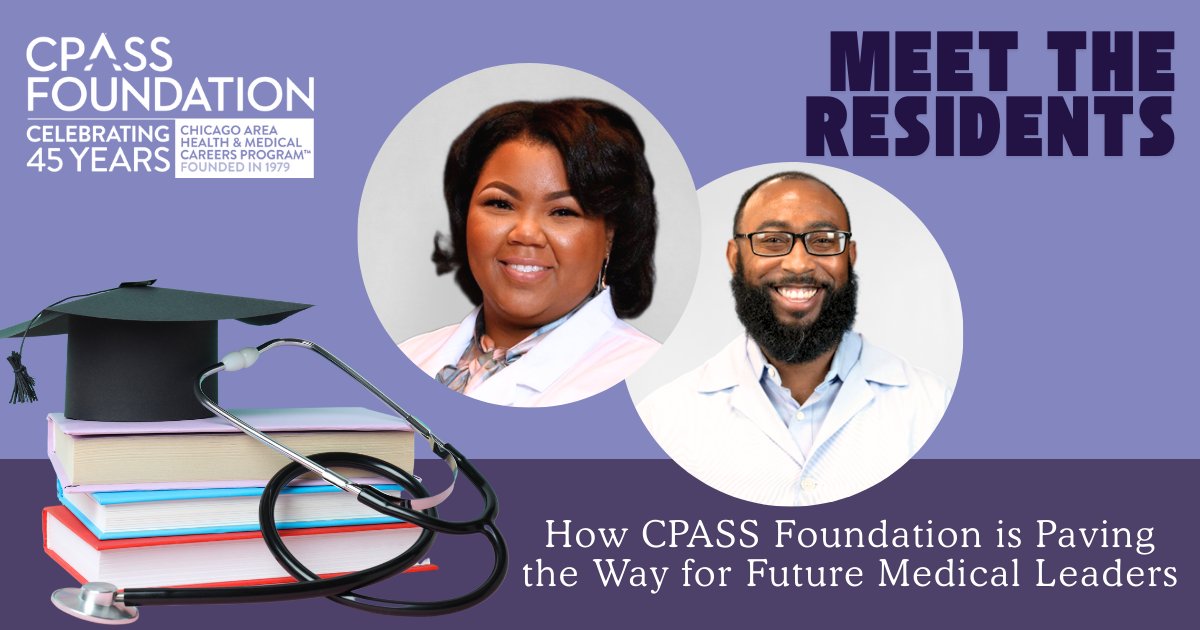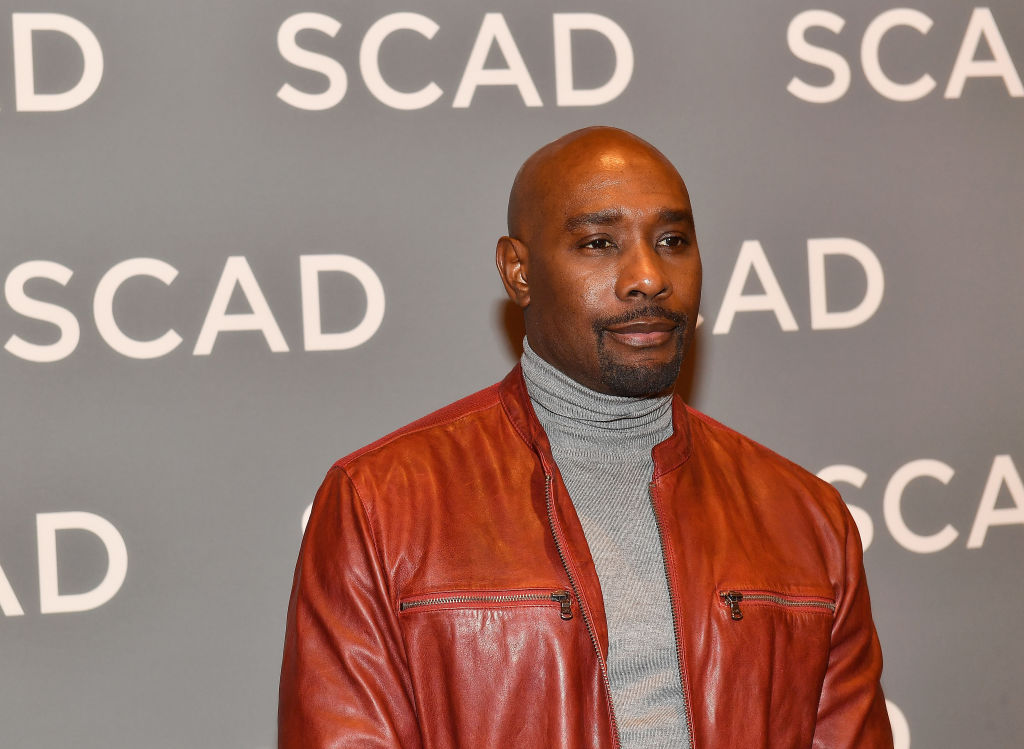
Charles Tate and Charissa Carroll mark significant milestones in their medical careers with help from the CPASS Foundation
Charles Tate was one of more than 30 million viewers who regularly tuned in to watch ER, a top-rated hospital drama that capped NBC’s “Must See TV” Thursday primetime block from 1994 to 2009. His favorite character? Dr. Peter Benton, the trailblazing black surgeon portrayed by Eriq La Salle.
Growing up on the south side of Chicago and in the city’s southern suburbs, Charles witnessed the difficulties his grandmother, who died of uterine cancer, and his mother, who suffered from heart disease, endured. They were both impacted by barriers obtaining quality healthcare. This inspired him to consider a career in medicine. But it was seeing a character like him — a black man from Chicago — represented on his favorite television show that made him believe becoming a doctor was possible. 
Coming from low-income schools and as a first-generation college student and a single father to a young daughter, Charles faced an uphill battle when he transitioned to college. He simply didn’t have the same resources, including high school exposure to advanced math and science, as his white counterparts.
“It was hard going from not having a solid science background to being in a 300-person class designed to weed people out,” Charles said. With the help of tutors, he graduated in five years from the University of Illinois at Chicago with a Bachelor of Science in Kinesiology with a minor in nutrition. “There were 100 black premed students who started with me, but I was the only one who finished in health sciences.”
The first time he took the MCAT, his scores fell short. Determined, he invested in a Princeton Review course, improving his scores the second time around — but still not enough to secure him a spot in medical school.
“Me and standardized tests have never been the best of friends,” he says. “But my mom describes me as the little engine that could.”
Becoming a Champion
In his junior year of undergrad, Charles visited Project Brotherhood, a men’s health initiative founded by CPASS Board Chair and CAHMCP alumnus Dr. Eric E. Whitaker, while he was taking an urban health class. That’s where he learned about the Chicago Area Health and Medical Careers Program™ (CAHMCP), affectionately known as “Champs,” and was put in contact with a mentor. Champs invested in Charles with a Kaplan test prep program, which helped him score high enough on the MCAT to apply to medical school.
CHAMPS is the predecessor program of the Creating Pathways and Access for Student Success™ Foundation, or CPASS, that supports underrepresented high school and college students interested in health careers.
Charles continued his education at Rosalind Franklin University, where he earned a Master of Science in healthcare administration. When his daughter was 13 years old, he matriculated at Chicago Medical School at Rosalind Franklin University. When it was time to prepare for the U.S. Medical Licensing Examinations, known as Step exams, and begin applying for residency programs, he again turned to CPASS for assistance.
“It was financially difficult raising a child and having student loans already, then extra fees for test prep, exams, and travel made it even harder,” Charles said. “When CPASS offered to pay for Kaplan and fees for Step 1 and Step 2, and travel to the residency second look events, it was a game changer.”
Today, Charles is in his first year of his emergency medicine residency at University of Illinois College of Medicine Peoria, and his daughter is in college considering a career in nursing.
“Getting more exposure and finding out that programs like CPASS exist is so important,” Charles said. “If you want to increase minority participation, you need to find people where they are.”
From the Bayou to IU
For Louisiana native Charissa Carroll, the inspiration to pursue a career in medicine came later. She was majoring in chemical engineering at Southern University and A&M College in Baton Rouge when an internship taught her that engineering wasn’t the best fit for her. Before changing majors, she reflected on the last time she enjoyed work, and remembered fondly her internship at a VA hospital and a mini-med program she did in high school.
“As a first-generation college student, I did not feel prepared for aspects of higher education,” Charissa said. While she found success academically, what she was missing was help charting the pathway to her future. “I just kept taking classes and did my best to figure it out. I wish there had been better guidance.”
As she was completing a Bachelor of Science in chemistry, Charissa took the MCAT three times. “I had no idea what I was doing at first. I didn’t know how to study for it. I didn’t know what I was walking into,” she said.
Before her third exam, she scraped together the money to pay for a Princeton Review test prep class and scored what she needed to apply to medical school.
Charissa was in medical school at University of Illinois College of Medicine Peoria when she learned about CPASS while volunteering for a similar local youth mentorship program for disadvantaged students interested in STEM. Like Charles, Charissa received financial help for Step exams and residency interviews, along with mentoring from Dr. Nicole Thompson and other black doctors who understood the challenges she was facing.
“Med school is very expensive, especially coming from a socioeconomic background like mine. Knowing help was available from CPASS gave me the confidence to buy a good suit that fit me well and interview for residency programs,” she said. “This helped me to focus at a time when I felt like I was drowning due to family events at the same time as finishing med school and the prospect of moving for my residency. It meant so much to find someone who understood the struggle and the financial stress.”
Charissa is currently doing well as a first-year family medicine resident at IU Health Ball Memorial Hospital in Muncie, Indiana. Her mentors helped her to understand that no one comes into residency feeling prepared, that it’s a huge transition, and to think of it as just the fourth year of medical school. They told her to “Embrace all the feelings; all the experiences,” she said. “That’s how you learn and become a better doctor.”
The only regret Charissa has is that she wasn’t able to access a program like CPASS sooner, while she was in Louisiana. “I think my path would have been more streamlined if I had advice on career options and healthcare fields and knowing what it took to get to them sooner,” she said. “It would have been great to have had a mentor to help me understand the process.”
She credits everyone she encountered at CPASS with some of her success. “They’ve all been so helpful. It’s a hard journey, but they encouraged me not to give up.”
She plans to pay it forward to the next generation of future black physicians and shares the advice she gained: “Find a mentor. Don’t give up. Keep going. It’s meant to be for you.”
How CPASS Feeds the Healthcare Pipeline
CPASS, along with its predecessor program, CAHMCP, has been focused on increasing the number of qualified underrepresented minority applicants from the City of Chicago to medical and other health professional schools since 1979. In recent years, CPASS has expanded its focus to more communities in Illinois and additional science, technology, engineering, math, and medicine (STEMM) professions.
CPASS programs serve students and their parents from fourth grade through medical residency in partnership with numerous volunteers and several local colleges, universities, and medical schools.
–
Supporting students like Charles and Charissa is a powerful way to invest in a more inclusive healthcare future and make a tangible difference in the lives of underrepresented students. Every contribution enables CPASS to provide vital resources like mentorship, test prep, and financial support to students who are breaking through barriers on their journey to medical school and beyond. By donating to CPASS at cpassfoundation.org or texting “STEMM” to 53-555, you’ll be directly empowering aspiring healthcare professionals who share Charles and Charissa’s commitment to giving back to their communities.
Follow us on social media @cpassfoundation to stay connected and see the impact of your support. Let’s help more students follow their dreams and build healthier communities for us all.









